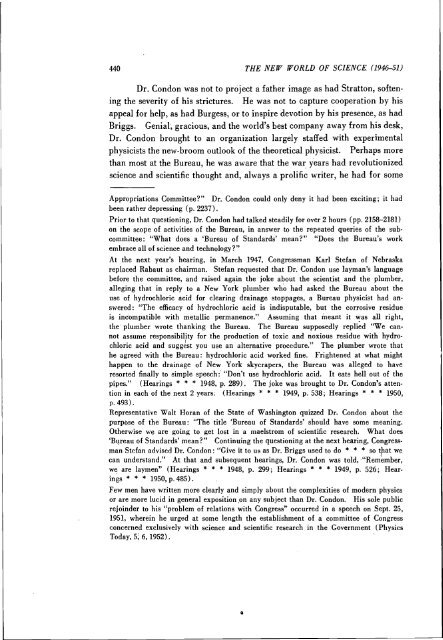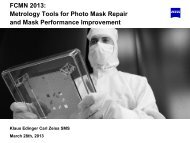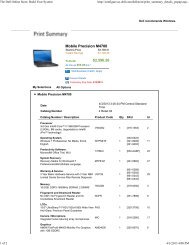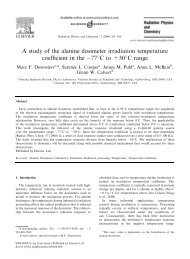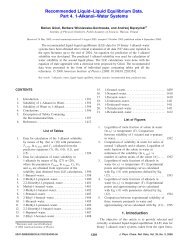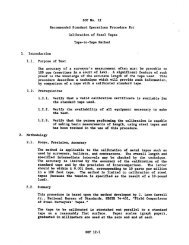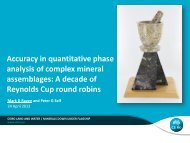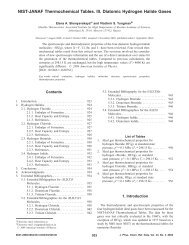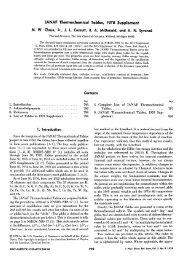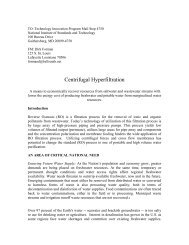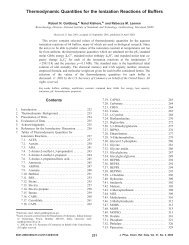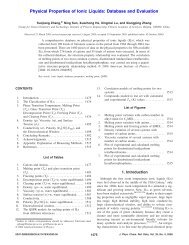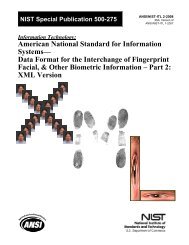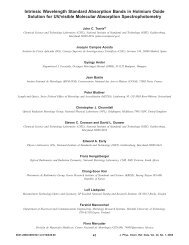- Page 1 and 2:
Rexmond C. Cochrane MP 275 UNITED S
- Page 3 and 4:
Grateful acknowledgment is made to
- Page 5 and 6:
IV FOREWORD There are many examples
- Page 7 and 8:
VI PREFACE Vannevar Bush, architect
- Page 9 and 10:
VIII AUTHOR'S INTRODUCTION so many
- Page 11 and 12:
CONTENTS Page FOREWORD 'U PREFACE v
- Page 13 and 14:
CONTENTS XIII Chapter II. FOUNDING
- Page 15 and 16:
CONTENTS XV Chapter III. ELECTRICIT
- Page 17 and 18:
CONTENTS XVII Chapter IV. THE WAR Y
- Page 19 and 20:
CONTENTS Chapter V. THE TIDE OF COM
- Page 21:
CONTENTS XXI Chapter VII. WORLD WAR
- Page 24 and 25:
XXIV CONTENTS THE CRUCIAL DECADE—
- Page 26 and 27:
MAIN STREET, 1900 AT THE TURN OF TH
- Page 28 and 29:
MAIN STREET, 1900 The marvel of the
- Page 30 and 31:
MAIN STREET, 1900 5 prosperous more
- Page 32 and 33:
MAIN STREET, 1900 Equally amazing w
- Page 34 and 35:
THE SHAPE OF THINGS TO COME 9 Among
- Page 36 and 37:
THE SHAPE OF THINGS TO COME 11 make
- Page 38 and 39:
THE SHAPE OF THINGS TO COME 13 stit
- Page 40 and 41:
THE SHAPE OF THINGS TO COME 15 comm
- Page 42 and 43:
GOVERNMENT, SCIENCE, AND THE GENERA
- Page 44 and 45:
GOVERNMENT, SCIENCE, AND THE GENERA
- Page 46 and 47:
LOOKING BACK 21 was maintained only
- Page 48 and 49:
LOOKING BACK 23 general public. Ada
- Page 50 and 51:
LOOKING BACK 25 many more as he cou
- Page 52 and 53:
LOOKING BACK 27 barometric pressure
- Page 54 and 55:
LOOKING BACK 29 Prototypes of the w
- Page 56 and 57:
LOOKING BACK 31 Without the force o
- Page 58 and 59:
LAISSEZ-FAIRE STANDARDS 33 necessar
- Page 60 and 61:
LAISSEZ-FAIRE STANDARDS 35 the Stat
- Page 62 and 63:
LAISSEZ-FAIRE STANDARDS 37 Some of
- Page 64 and 65:
A NATiONAL NEED . . . A NATIONAL HU
- Page 66 and 67:
A NATiONAL NEED . . . A NATIONAL HU
- Page 68 and 69:
A NATIONAL NEED .. . A NATIONAL HUM
- Page 70 and 71:
A NATIONAL NEED . . . A NATIONAL HU
- Page 72 and 73:
A NATIONAL NEED . . . A NATIONAL HU
- Page 74 and 75:
SAMUEL WESLEY STRATTON FOUNDING THE
- Page 76 and 77:
SAMUEL WESLEY STRATTON 51 fessor of
- Page 78 and 79:
SAMUEL WESLEY STRATTON ing Professo
- Page 80 and 81:
SAMUEL WESLEY STRATTON 55 For over
- Page 82 and 83:
Dr. Frank A. Wolff, Jr., who was ab
- Page 84 and 85:
SAMUEL WESLEY STRATTON 59 TIlE EVEN
- Page 86 and 87:
SAMUEL WESLEY STRATTON appeared as
- Page 88 and 89:
EDWARD B. ROSA 63 Dr. Edward B. Ros
- Page 90 and 91:
EDWARD B. ROSA 65 Free exercise of
- Page 92 and 93:
EDWARD B. ROSA 67 Dr. Charles W. Wa
- Page 94 and 95:
THE NEW BUREAU LABORATORIES 69 exer
- Page 96 and 97:
THE NEW BUREAU LABORATORIES 71 Chas
- Page 98 and 99:
ACQUIRING NATIONAL STANDARDS 73 mad
- Page 100 and 101:
ACQUIRING NATIONAL STANDARDS Divisi
- Page 102 and 103:
ACQUIRING NATIONAL STANDARDS 77 ref
- Page 104 and 105:
ACQUIRING NATIONAL STANDARDS 79 in
- Page 106 and 107:
ACQUIRiNG NATIONAL STANDARDS The wo
- Page 108 and 109:
AN AUTUMN FIRE AND A CONSUMERS' CRU
- Page 110 and 111:
The Baltimore fire of 1904. The tur
- Page 112 and 113:
AN AUTUMN FIRE AND A CONSUMERS' CRU
- Page 114 and 115:
AN: AUTUMN FIRE AND CONSUMERS' CRUS
- Page 116 and 117:
THE BEGINNING OF GOVERNMENT TESTING
- Page 118 and 119:
THE BEGINNING OF 93 gates, poured c
- Page 120 and 121:
The Bureau about 1910, just prior t
- Page 122 and 123:
The 2,300,000-pound Emery testing m
- Page 124 and 125:
THE BEGiNNING OF GOVERNMENT TESTING
- Page 126 and 127:
THE BEGINNING OF GOVERNMENT TESTING
- Page 128 and 129:
STANDARDS FOR THE AGE OF ELECTRICIT
- Page 130 and 131:
STANDARDS FOR THE AGE OF ELECTRICiT
- Page 132 and 133:
STANDARDS FOR THE AGE OF ELECTRICIT
- Page 134 and 135:
STANDARDS FOR THE AGE OF ELECTRICIT
- Page 136 and 137:
STANDARDS FOR PUBLiC UTILITIES 111
- Page 138 and 139:
Laboratory setup for testing the ca
- Page 140 and 141:
STANDARDS FOR PUBLIC UTILITIES 115
- Page 142 and 143:
The first iVBS railway scale test c
- Page 144 and 145:
STANDARDS FOR PUBLIC UTILITIES 119
- Page 146 and 147:
STANDARDS FOR PUBLIC UTILITIES 121
- Page 148 and 149:
STANDARDS FOR PUBLIC UTILITIES 123
- Page 150 and 151:
TESTING GOVERNMENT MATERIALS 125 Go
- Page 152 and 153:
TESTING GOVERNMENT MATERIALS 127 an
- Page 154 and 155:
TESTING GOVERNMENT MATERIALS 129 se
- Page 156 and 157:
TESTING GOVERNMENT MATERIALS 131 In
- Page 158 and 159:
STANDARDS FOR THE CONSUMER 133 in t
- Page 161 and 162:
136 ELECTRICITY, RAILROADS, AND RAD
- Page 163 and 164:
138 ELECTRICITY, RAILROADS, AND RAD
- Page 165 and 166:
140 ELECTRICITY, RAILROADS, AND RAD
- Page 167 and 168:
142 ELECTRICITY, RAILROADS, AND RAD
- Page 169 and 170:
144 ELECTRICITY, RAILROADS, AND RAD
- Page 171 and 172:
146 ELECTRICITY, RAILROADS, AND RAD
- Page 173 and 174:
148 ELECTRICiTY, RAILROADS, AND RAD
- Page 175 and 176:
cJ1 OF COMME The proliferation of B
- Page 177 and 178:
152 ELECTRiCITY, RAILROADS, AND RAD
- Page 179 and 180:
154 ELECTRICITY, RAiLROADS, AND RAD
- Page 181 and 182:
156 ELECTRICITY, RAILROADS, AND RAD
- Page 183 and 184:
158 ELECTRICITY, RAILROADS, AND RAD
- Page 185 and 186:
160 THE WAR YEARS (1917-19) design.
- Page 187 and 188:
162 THE WAR YEARS (1917-19) and Gov
- Page 189 and 190:
164 Abate, the experimental roiling
- Page 191 and 192:
Mule teams leveling the ground for
- Page 193 and 194:
C' The Standard Store and gas stati
- Page 195 and 196:
170 THE WAR YEARS (1917-19) physici
- Page 197 and 198:
172 THE WAR YEARS (1917-19) it was
- Page 199 and 200:
174 THE WAR YEARS (1917-19) where t
- Page 201 and 202:
176 THE WAR YEARS (1917-19) industr
- Page 203 and 204:
178 THE WAR YEARS (1917-19) cut fro
- Page 205 and 206:
180 THE WAR YEARS (1917-19) flew at
- Page 207 and 208:
182 THE WAR YEARS (1917-19) Except
- Page 209 and 210:
184 THE WAR YEARS (1917-19) But so
- Page 211 and 212:
186 THE WAR YEARS (1917-19) make it
- Page 214 and 215:
OPTICAL GLASS AND OPTICAL INSTRUMEN
- Page 216 and 217:
NEW THINGS IN RADIO COMMUNICATION 1
- Page 219 and 220:
194 THE WAR YEARS (1917-19) read,"
- Page 221 and 222:
196 THE WAR YEARS (1917-19) up clea
- Page 223 and 224:
198 THE WAR YEARS (1917-19) The use
- Page 225 and 226:
200 THE WAR YEARS (1917-19) program
- Page 227 and 228:
202 THE WAR YEARS (1917-19) investi
- Page 229 and 230:
204 THE WAR YEARS (1917-19) certain
- Page 231 and 232:
206 THE WAR YEARS (1917-19) large-s
- Page 233 and 234:
208 THE WAR YEARS (1917-19) some ye
- Page 235 and 236:
210 . THE WAR YEARS (1917-19) estab
- Page 237 and 238:
212 THE WAR YEARS (1917-19) trade f
- Page 239 and 240:
214 THE WAR YEARS (1917-19) As appr
- Page 241 and 242:
216 THE WAR YEARS (1917-19) necessa
- Page 243 and 244:
218 THE WAR YEARS (1917-19) tripled
- Page 245 and 246:
The Physikalisch-Technische Reichsa
- Page 247 and 248:
222 THE TIDE OF COMMERCE AND INDUST
- Page 249 and 250:
224 THE TIDE OF COMMERCE AND INDUST
- Page 251 and 252:
226 THE TIDE OF COMMERCE AND INDUST
- Page 253 and 254:
228 THE TIDE OF COMMERCE AND INDUST
- Page 255 and 256:
230 THE TIDE OF COMMERCE AND INDUST
- Page 257 and 258:
232 THE TIDE OF COMMERCE AND iNDUST
- Page 259 and 260:
234 THE TIDE OF COMMERCE AND INDUST
- Page 261 and 262:
236 THE TIDE OF COMMERCE AND INDUST
- Page 263 and 264:
238 Unlike Stratton, Dr. George K.
- Page 265:
240 THE TIDE OF COMMERCE AND INDUST
- Page 268 and 269:
The Visiting Committee of the Secre
- Page 270 and 271:
GEORGE KIMBALL BURGESS 245 and ofte
- Page 272 and 273:
GEORGE KIMBALL BURGESS 247 Bureau n
- Page 274 and 275:
BUiLDING AND HOUSING 249 Although i
- Page 276 and 277:
BUILDING AND HOUSING 251 The spring
- Page 278 and 279:
THE CRUSADE FOR STANDARDIZATION 253
- Page 280 and 281:
THE CRUSADE FOR STANDARDIZATiON 255
- Page 282 and 283:
THE CRUSADE FOR STANDARDIZATION 257
- Page 284 and 285:
THE CRUSADE FOR STANDARDIZATION 259
- Page 286 and 287:
THE CRUSADE FOR STANDARDIZATION 261
- Page 288 and 289:
RESEARCH FOR INDUSTRY 263 RESEARCH
- Page 290 and 291:
RESEARCH FOR INDUSTRY 265 appliance
- Page 292 and 293:
RESEARCH FOR INDUSTRY 267 molasses
- Page 294 and 295:
RESEARCH FOR INDUSTRY quest of the
- Page 297 and 298:
272 THE TIDE OF COMMERCE AND INDUST
- Page 299 and 300:
274 THE TIDE OF COMMERCE AND INDUST
- Page 301 and 302:
276 THE TIDE OF COMMERCE AND INDUST
- Page 303 and 304:
278 Freighted with apparatus design
- Page 305 and 306:
280 THE TIDE OF COMMERCE AND INDUST
- Page 307 and 308:
282 THE TIDE OF COMMERCE AND INDUST
- Page 310 and 311:
AUTOMOBILES AND AIRCRAFT 285 Testin
- Page 312 and 313:
POLICING THE ETHER 287 circuit crys
- Page 314 and 315:
POLICING THE ETHER 289 died in comm
- Page 316 and 317:
POLICING THE ETHER 291 If simple re
- Page 318 and 319:
POLICING THE ETHER 293 Bureau turne
- Page 320 and 321:
POLICING THE ETHER 295 a special hi
- Page 322 and 323:
POLICING THE ETHER 297 and radiotel
- Page 324 and 325:
THE BUREAU IN THE PUBLIC VIEW THE T
- Page 326 and 327:
THE BUREAU IN THE PUBLIC VIEW 301 t
- Page 328 and 329:
THE BUREAU IN THE PUBLIC VIEW 303 l
- Page 330 and 331:
THE BUREAU IN THE PUBLiC VIEW 305 e
- Page 332 and 333:
THE BUREAU IN THE PUBLIC VIEW 307 a
- Page 334 and 335:
LYMAN JAMES BRIGGS 309 the wake of
- Page 336 and 337:
LYMAN JAMES BRIGGS 311 The Bureau w
- Page 338 and 339:
LYMAN JAMES BRIGGS 313 Receiving th
- Page 340 and 341:
Dr. Hugh L. Dryden made some of thi
- Page 342 and 343:
LYMAN JAMES BRJGGS 317 active inter
- Page 344 and 345:
LYMAN JAMES BRJGGS 319 new administ
- Page 346 and 347:
TOWARD A REDEFINiTION OF BUREAU FUN
- Page 348 and 349:
TOWARD A REDEFINITION OF BUREAU FUN
- Page 350 and 351:
TOWARD A REDEFINiTION OF BUREAU FUN
- Page 352 and 353:
TOWARD A REDEFINITION OF BUREAU FUN
- Page 354 and 355:
TOWARD A REDEFINITION OF BUREAU FUN
- Page 356 and 357:
TOWARD A REDEFINITION OF BUREAU FUN
- Page 358 and 359:
TOWARD A REDEFINITION OF BUREAU FUN
- Page 360 and 361:
SOME FUNDAMENTAL WORK ON STANDARDS
- Page 362 and 363:
SOME FUNDAMENTAL WORK ON STANDARDS
- Page 364:
SOME FUNDAMENTAL WORK ON STANDARDS
- Page 367 and 368:
342 THE TIME OF THE GREAT DEPRESSIO
- Page 369 and 370:
344 THE TIME OF THE GREAT DEPRESSIO
- Page 371 and 372:
346 THE TIME OF THE GREAT DEPRESSIO
- Page 373 and 374:
348 THE TiME OF THE GREAT DEPRESSIO
- Page 375 and 376:
350 THE TIME OF THE GREAT DEPRESSIO
- Page 377 and 378:
352 THE TIME OF THE GREAT DEPRESSIO
- Page 379 and 380:
354 THE TIME OF THE GREAT DEPRESSIO
- Page 381 and 382:
356 THE TIME OF THE GREAT DEPRESSIO
- Page 383 and 384:
358 THE TIME OF THE GREAT DEPRESSIO
- Page 385 and 386:
360 THE TIME OF THE GREAT DEPRESSIO
- Page 387 and 388:
362 THE TIME OF THE GREAT DEPRESSIO
- Page 389 and 390:
364 THE TIME OF THE GREAT DEPRESSIO
- Page 391 and 392:
366 WORLD WAR II RESEARCH (1941-45)
- Page 393 and 394:
368 WORLD WAR II RESEARCH (1941-45)
- Page 395 and 396:
370 WORLD WAR I! RESEARCH (1941-45)
- Page 397 and 398:
372 WORLD WAR II RESEARCH (1941-45)
- Page 399 and 400:
374 WORLD WAR II RESEARCH (1941-45)
- Page 401 and 402:
• amounts 376 WORLD WAR II RESEAR
- Page 403 and 404:
378 WORLD WAR II RESEARCH (1941-45)
- Page 405 and 406:
380 WORLD WAR II RESEARCH (1941-45)
- Page 407 and 408:
382 WORLD WAR II RESEARCH (1941-45)
- Page 409 and 410:
384 WORLD WAR II RESEARCH (1941-45)
- Page 412 and 413:
THE BUREAU AND THE ATOMIC BOMB 387
- Page 414 and 415: THE RADIO PROXIMiTY FUZE 389 ness o
- Page 416 and 417: THE RADIO PROXIMITY FUZE 391 A vari
- Page 418 and 419: THE RADIO PROXIMiTY FUZE 393 Actual
- Page 420 and 421: THE RADIO PROXIMITY FUZE 395 and ot
- Page 422 and 423: THE RADIO PROXIMITY FUZE 397 Novemb
- Page 424 and 425: A GUIDED MISSILE CALLED THE BAT 399
- Page 426 and 427: A GUIDED MISSILE CALLED THE BAT 401
- Page 428 and 429: RADIO AND RADIO-WEATHER PREDICTING
- Page 430 and 431: RADIO AND RADIO-WEATHER PREDICTING
- Page 432 and 433: RADIO AND RADIO-WEATHER PREDiCTING
- Page 434 and 435: RADIO AND RADIO-WEATHER PREDICTiNG
- Page 436 and 437: RESEARCH IN CRITICAL MATERIALS 411
- Page 438 and 439: RESEARCH IN CRITICAL lilA TERIALS 4
- Page 440 and 441: RESEARCH IN CRiTICAL MATERIALS 415
- Page 442 and 443: RESEARCH IN CRITICAL MATERIALS 417
- Page 444 and 445: RESEARCH ZN CRiTiCAL MATERIALS 419
- Page 446 and 447: RESEARCH IN CRITICAL MATERIALS 421
- Page 448 and 449: RESEARCH IN CRITICAL MATERIALS 423
- Page 450 and 451: RESEARCH IN CRITICAL MATERIALS 425
- Page 452 and 453: "THE PECULIAR PEACE" THE NEW WORLD
- Page 454 and 455: THE PECULIAR PEACE cated the fissio
- Page 456 and 457: THE PECULIAR PEACE Further augmenti
- Page 458 and 459: THE PECULIAR PEACE 433 Dr. Briggs a
- Page 460 and 461: EDWARD UHLER CONDON weapon and the
- Page 462 and 463: EDWARD UHLER CONDON While at Prince
- Page 466 and 467: EDWARD UHLER CONDON time expounded
- Page 468 and 469: EDWARD UHLER CONDON 443 prehended b
- Page 470 and 471: EDWARD UHLER CONDON 445 in larger u
- Page 472 and 473: TECHNOLOGICAL VS. BASIC RESEARCH a
- Page 474 and 475: TECHNOLOGICAL VS. BASIC RESEARCH 44
- Page 476 and 477: TECHNOLOGICAL• VS. BASIC RESEARCH
- Page 478 and 479: TECHNOLOGICAL VS. BASIC RESEARCH 45
- Page 480 and 481: The Standards Eastern Automatic Com
- Page 482 and 483: 4. Assembly of the chassis of the S
- Page 484 and 485: The of the magnetic fluid clutch is
- Page 486 and 487: TECHNOLOGICAL VS. BASIC RESEARCH el
- Page 488 and 489: TECHNOLOGICAL VS. BASiC RESEARCH 46
- Page 490 and 491: TECHNOLOGICAL VS. BASIC RESEARCH 46
- Page 492 and 493: NUCLEAR PHYSICS AND RADIO PROPAGATI
- Page 494 and 495: NUCLEAR PHYSICS AND RADIO PROPAGATI
- Page 496 and 497: NUCLEAR PHYSICS AND RADIO PROPAGATI
- Page 498 and 499: '.-. The NBS Boulder Laboratories i
- Page 500 and 501: NUCLEAR PHYSICS AND RADIO PROPAGATi
- Page 502 and 503: HIGH POLYMERS AND BUILDING RESEARCH
- Page 504 and 505: HiGH POLYMERS AND BUILDING RESEARCH
- Page 506 and 507: HIGH POLYMERS AND BUILDING RESEARCH
- Page 508 and 509: HIGH POLYMERS AND BUiLDING RESEARCH
- Page 510 and 511: HIGH POLYMERS AND BUILDING RESEARCH
- Page 512 and 513: GOLDEN ANNIVERSARY 487 on storage b
- Page 514 and 515:
GOLDEN ANNIVERSARY 489 more up to d
- Page 516 and 517:
GOLDEN ANNIVERSARY 491 ment of Defe
- Page 518 and 519:
GOLDEN ANNIVERSARY 493 tor was the
- Page 520 and 521:
AN AD HOC COMMITTEE REPORTS THE CRU
- Page 522 and 523:
AN AD HOC COMMITTEE REPORTS 497 Sec
- Page 524 and 525:
AN AD HOC COMMITTEE REPORTS 499 par
- Page 526 and 527:
AN AD HOC COMMITTEE REPORTS 501 unf
- Page 528 and 529:
GAJTHERSBURG money or reimbursable
- Page 530 and 531:
GAJTHERSBURG 505 car) from downtown
- Page 532 and 533:
GAITHERSBURG 507 It was this fact,
- Page 534 and 535:
RETROSPECT AND PROSPECT 509 in phys
- Page 536 and 537:
RETROSPECT AND PROSPECT 511 mathema
- Page 538 and 539:
RETROSPECT AND PROSPECT 513 The spi
- Page 540 and 541:
APPENDIX A FERDINAND RUDOLPH HASSLE
- Page 542 and 543:
APPENDIX A 517 Geodetics became the
- Page 544 and 545:
APPENDIX A 519 When not tending the
- Page 546 and 547:
APPENDIX A 521 "Hassler wanted his
- Page 548 and 549:
APPENDIX A a salary of $3,000 and $
- Page 550 and 551:
APPENDIX A According to Dr. Lewis V
- Page 552 and 553:
THE FRENCH ORIGIN OF THE METRIC SYS
- Page 554 and 555:
APPENDIX B The results of the compu
- Page 557 and 558:
532 APPENDIX B The preparation of t
- Page 559 and 560:
534 APPENDIX B and later Superinten
- Page 561 and 562:
536 The small palace that is the in
- Page 563 and 564:
538 APPENDIX C Joint Resolution of
- Page 565 and 566:
540 APPENDIX C 9. Of the Botanic Ga
- Page 567 and 568:
542 APPENDIX C SEC. 7. That the fol
- Page 569 and 570:
544 APPENDIX C and assayer; and the
- Page 571 and 572:
546 APPENDiX C several manufacturin
- Page 573 and 574:
548 APPENDIX C Whereas the Governme
- Page 575 and 576:
550 APPENDIX C for these units shal
- Page 577:
552 APPENDIX C (19) the compilation
- Page 581 and 582:
APPENDIX E MEMBERS OF THE COMMITTEE
- Page 583 and 584:
APPENDIX F NBS APPROPRIATIONS AND O
- Page 585 and 586:
5000 4500 4000 3500 3000 2500 2000
- Page 587 and 588:
APPENDIX 1 NOTES PUBLICATIONS OF TH
- Page 589 and 590:
APPENDIX J Almost certainly the fir
- Page 591 and 592:
572 APPENDIX I ELECTRICITY—Contin
- Page 593 and 594:
574 APPENDIX / III. THERMOMETRY, PY
- Page 595 and 596:
576 APPENDIX J V. CHEMISTRY Electro
- Page 597 and 598:
578 APPENDIX / Magnetic Measurement
- Page 599 and 600:
580 APPENDIX I Gas Engineering—Co
- Page 601 and 602:
582 APPENDIX J Pyrometry—Continue
- Page 603 and 604:
584 APPENDIX / Spectroscopy—Conti
- Page 605 and 606:
586 APPENDIX / Oils, Rubber, Paper,
- Page 607 and 608:
________ 588 APPENDIX J Cement, Con
- Page 609 and 610:
590 APPENDIX J Chemical Metallurgy
- Page 611 and 612:
592 APPENDIX I II. WEIGHTS AND MEAS
- Page 613 and 614:
CHIEFS OF THE SCIENTIFIC AND TECHNI
- Page 615 and 616:
596 APPENDIX / VII. STRUCTURAL ENGI
- Page 617 and 618:
598 III. HEAT AND POWER—Continued
- Page 619 and 620:
ADMINISTRATIVE, SCIENTIFIC, AND TEC
- Page 621 and 622:
602 APPENDIX / VIII. METALLURGY 1.
- Page 623 and 624:
604 APPENDIX / III. HEAT AND POWER
- Page 625 and 626:
606 APPENDIX / XII. CODES AND SPECI
- Page 627 and 628:
608 APPENDIX / III. HEAT AND POWER
- Page 629 and 630:
610 APPENDIX I IX. CLAY AND SILICAT
- Page 631 and 632:
ADMINISTRATIVE, SCIENTIFIC, AND TEC
- Page 633 and 634:
614 APPENDIX I V. CHEMISTRY 1. Pain
- Page 635 and 636:
616 APPENDIX / XIII. ELECTRONICS AN
- Page 637 and 638:
ADMINISTRATIVE, SCIENTIFIC, AND TEC
- Page 639 and 640:
620 IV. ATOMIC AND RADIATION PHYSIC
- Page 641 and 642:
622 APPENDIX J XII. DATA PROCESSING
- Page 643 and 644:
ADMINISTRATIVE, SCIENTIFIC, AND TEC
- Page 645 and 646:
626 APPENDIX I VI. MECHANICS—Cont
- Page 647 and 648:
628 APPENDIX I XV. PHYSICAL CHEMIST
- Page 649 and 650:
630 APPENDIX I 87. Upper Atmosphere
- Page 651 and 652:
632 APPENDIX K Nat!. Adv. Comm. Nat
- Page 653 and 654:
634 APPENDIX K 4. OPTICS 5. CHEMIST
- Page 655 and 656:
636 APPENDiX K 2. WEIGHTS & MEASURE
- Page 657 and 658:
638 APPENDIX K 6. ENGINEERING PHYSI
- Page 659 and 660:
640 APPENDIX K 2. WEIGHTS & MEASURE
- Page 661 and 662:
642 APPENDIX• K 6. MECHANICS Gilc
- Page 663 and 664:
644 APPENDIX K 2. WEIGHTS & MEASURE
- Page 665 and 666:
646 APPENDIX K NATIONAL BUREAU OF S
- Page 667 and 668:
8. METALLURGY APPENDIX K Hobbs, [Lu
- Page 669 and 670:
APPENDIX M SAMUEL WESLEY STRATTON F
- Page 671 and 672:
4PPENDIX M 653 dent's house and act
- Page 673 and 674:
APPENDIX M 655 Prior to his appoint
- Page 675 and 676:
APPENDIX M 657 Oneida, the latter a
- Page 677 and 678:
APPENDIX M 659 Stratton to serve on
- Page 679 and 680:
APPENDIX M 661 materials gathered o
- Page 681 and 682:
664 APPENDIX N Philosophical L i b
- Page 683 and 684:
666 APPENDIX N Judd, Deane Brewster
- Page 685 and 686:
APPENDIX 0 BUILDINGS AND STRUCTURES
- Page 687 and 688:
APPENDIX 0 671 Estimated Estimated
- Page 689 and 690:
BIBLIOGRAPHIC NOTE Predecessors of
- Page 691 and 692:
BIBLIOGRAPHIC NOTE 675 century, and
- Page 693 and 694:
BIBLIOGRAPHIC NOTE 677 IBrady, Robe
- Page 695 and 696:
BIBLIOGRAPHIC NOTE 679 Schmidt, Kar
- Page 697 and 698:
BIBLIOGRAPHIC NOTE 681 NBS HISTORIC
- Page 699 and 700:
684 American Mining Congress, 121,
- Page 701 and 702:
686 background, 237. 239 BURGESS—
- Page 704 and 705:
iNDEX electromagnetic units, 105 el
- Page 706 and 707:
INDEX 691 High Voltage Laboratory,
- Page 708 and 709:
INDEX London Wireless Conference (s
- Page 710 and 711:
INDEX name changes, 43, 48, 69, 332
- Page 712 and 713:
INDEX organic reagents, high.purity
- Page 714 and 715:
INDEX 699 Radium and X-ray section,
- Page 716 and 717:
INDEX standardization, arbitrary, 1
- Page 718 and 719:
INDEX WALKER, Percy H., 155 WALLACE


